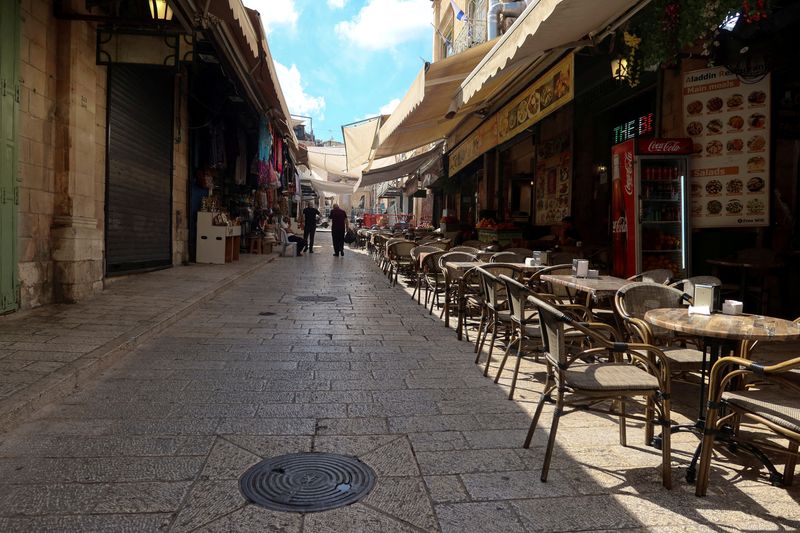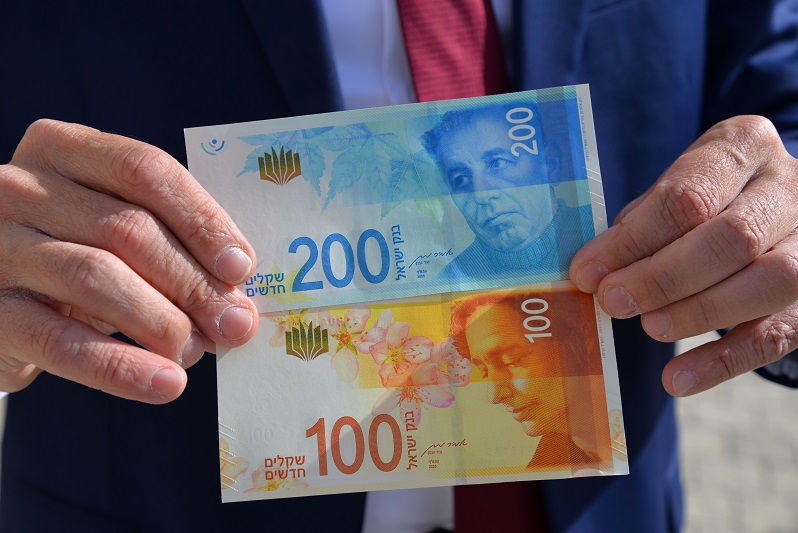By Steven Scheer and Ari Rabinovitch
JERUSALEM (Reuters) - A depleted workforce. Constant rocket sirens. The lingering shock of an unexpected attack. The cost to Israel's economy of its war with Hamas militants will be unlike anything it has experienced in decades.
The cranes that dot Tel Aviv's ever-growing skyline stood still for days after the city closed construction sites. They reopened this week under stricter safety guidelines but inactivity in this sector alone costs the economy an estimated 150 million shekels ($37 million) a day, an industry report said.
"This is not a hit for contractors or industrialists alone," said Raul Sarugo, president of the Israel Builders' Association. "This is a hit for every household in Israel."
Israel was blindsided on Oct. 7 by Hamas gunmen from Gaza who rampaged through border towns in the deadliest attack on civilians in its history. In the two weeks since, its military has carried out a devastating bombardment in Gaza.
Israel's almost $500 billion economy, the most developed in the Middle East with strengths in technology and tourism, was healthy for most of 2023. Growth was on track to reach 3% this year with low unemployment.
But with a ground invasion of Gaza likely imminent and the war threatening to spiral into a regional conflict, Israelis are hunkering down and spending much less on everything except food. Ratings agencies have already warned they could downgrade their assessment of the country's creditworthiness.
Hundreds of thousands of army reservists have been called up, leaving a gaping hole in manpower and disrupting supply chains from seaports to supermarkets, while retailers are furloughing employees. The shekel has slumped.
The conflict has also halted the movement of thousands of Palestinian labourers from Gaza to Israel and curtailed the flow from the occupied West Bank.
The escalators and walkways of Jerusalem's main shopping mall were empty for the first two weeks of the war, though slowly patrons are venturing back.
"There has been a drastic decline in traffic," said Netanel Shraga, manager of the Columbia sportswear shop.
HIGH-TECH
Some of Shraga's staff have been called up to army service, he said. Others are too afraid to come to work.
Hotels are half-filled with Israeli evacuees from border areas, the rest of the rooms are mostly empty. Factories continue to operate, even those near Gaza, but there are not always enough truck drivers to make regular deliveries.
Credit card purchases were down 12% in the last week from the same period a year ago, with sharp drops in nearly all categories except for a spike in shopping at supermarkets.
The high-tech industry, which flourished during the COVID pandemic, is struggling. Usually it accounts for 18% of Israel's GDP and half of all exports.
"Productivity goes down significantly, because it's hard to focus on day-to-day work when you have existential concerns," said Barak Klein, chief financial officer at fintech firm ThetaRay.
Twelve of their 80 Israel-based employees were drafted into the reserves. Others have children home from school. And there is still the constant fear of rocket fire.
ThetaRay set up a day care center for employees who need to bring in children and has been relying on their offices abroad to take some of the workload.
Erel Margalit, whose JVP venture capital fund is one of the country's most active, said he has been jumping between board meetings, hearing about different business continuity plans.
"Investors need to be assured," he said.
An estimated 10-15% of the high-tech work force has been called up for reserve duty, said Dror Bin, CEO of the state-funded Israel Innovation Authority.
"We've been in touch with hundreds of tech companies, especially early stage ventures," Bin said, adding that many were in the middle of a funding round and are running out of money.
To help, his authority set up a 100 million shekel ($25 million) fund to help 100 tech startups weather the storm.
The Economy Ministry created a war room and put out a call for help. Its database has so far matched at least 8,550 people with struggling businesses. When a logistics center of a major supermarket chain was strained, 38 people were sent to fill an overnight shift.
"EMOTIONAL CRISIS"
The government has promised "no limit" in spending to finance the war and to compensate households and businesses affected, meaning a bigger budget deficit and more debt.
Past conflicts may not be a good guide to the economy's path. Gross domestic product fell as much as 0.5% in a 34-day war with Iran-backed Lebanese group Hezbollah in 2006 as exports dropped and manufacturing slowed, but a recovery followed quickly.
What's happening today is different, officials say.
There is an "emotional crisis" among the Israeli public and it is already taking a toll, said Leo Leiderman, chief economic adviser to Bank Hapoalim, one of the country's biggest banks.
"People will minimize their consumption spending, because of the uncertainty and the mood," he said.
With consumer spending accounting for more than half of economic activity, the damage to the economy may be significant.
"Israel was able to recover remarkably well from all the recent events of fighting," a senior Israeli Finance Ministry official told Reuters. "This seems to be a more dramatic event, even if it is really very early to know."
The Bank of Israel on Monday trimmed its economic growth estimate for 2023 to 2.3% from 3% and to 2.8% from 3.0% for 2024 assuming the war is contained to Gaza. Governor Amir Yaron - who is opposed to rate cuts for now - expects a rebound.

"We have known how to recover from difficult periods in the past and to return rapidly to prosperity," Yaron said. "I have no doubt that it will do so this time as well."
($1 = 4.0586 shekels)
